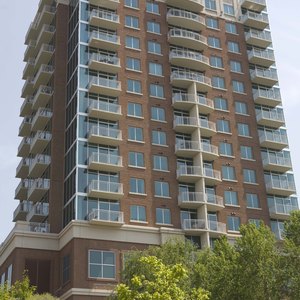
Homeowners in a newer development or condominium complex deal with a governing body run by their neighbors. Homeowners associations make and enforce rules for the community, helping to maintain aesthetic standards and protecting owner interests. Despite such benefits, homeowners may find certain HOA rules or practices hard to deal with. Often, the only recourse for correcting problems with an HOA is through the courts. As such, it's important to known the disadvantages of an HOA before moving into a community.
Fees
The HOA assesses a recurring fee for the services and amenities offered in the community, usually on a monthly basis. You pay this fee in addition to your mortgage, homeowners insurance and real estate taxes. The HOA bills you directly and can pursue you legally if you fall behind on payments. HOAs can use collection companies to recover payment and place a lien on your home's title, preventing you from selling or refinancing until you pay. Typical HOA fees range from just under $100 to several hundred, depending on the community type, location and services included.
CC&Rs
Covenants, conditions and restrictions (CC&Rs) outline the HOA rules. Homeowners, their guests and tenants must follow these bylaws. The most common restrictions found in the CC&Rs pertain to: pets, parking, shared facilities, property use and appearance. Changing rules may require a homeowner vote and usually involves board decision-making. HOAs often consult with attorneys to ensure they follow federal, state and local laws. To change a rule you feel strongly about, you may have to lobby your neighbors for support or pursue the issue legally at your own expense.
Aesthetics
Exterior paint colors, yard decorations and window coverings can be a point of contention for homeowners with an HOA. The associations often monitor how well you maintain your yard and can be quick to point out when the grass is overgrown or your trash bins have been sitting out too long. Breaking a rule pertaining to how your home looks usually results in having to fix the problem and possibly even paying a penalty.
Oversight
Your fellow homeowners compose the HOA board and may volunteer to oversee or enforce rules. As a nonprofit, the HOA relies on its homeowners to participate in oversight responsibilities and may also hire a property management company to handle daily tasks. Third-party management companies often manage several HOAs at once, making getting issues resolved through them harder. When dealing with volunteers and board members who are more accessible, a disagreement over an HOA issue can strain your relationship with your neighbor.
HOA Foreclosure
An HOA can foreclose on your home for failure to pay an association lien. Depending on your state's laws regarding HOA due process, the lien may need to meet certain requirements, such as a minimum balance and delinquency period. The HOA can foreclose despite a first and second mortgage, although state law and CC&Rs determine the payoff priority of the lien. Typically, CC&Rs state that an HOA lien is subordinate to, or lower in priority than a first mortgage. As such, a first mortgage remains on the property even after an HOA foreclosure.
HOA Lawsuits
A lawsuit against the HOA board or its volunteers can diminish association reserves and result in special assessments which residents pay. Common reasons for lawsuits involve accidents due to HOA negligence or mismanagement, discrimination against residents and mistakes by the neighborhood watch. Even when covered by the HOA's master insurance liability coverage, personal injury claims can cause dues to increase.
References
Writer Bio
Karina C. Hernandez is a real estate agent in San Diego. She has covered housing and personal finance topics for multiple internet channels over the past 10 years. Karina has a B.A. in English from UCLA and has written for eHow, sfGate, the nest, Quicken, TurboTax, RE/Max, Zacks and Opposing Views.

